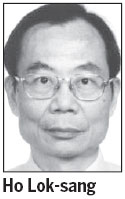Public interest key in economic reform
Updated: 2013-01-29 06:39
By Ho Lok Sang(HK Edition)
|
|||||||||

The Chief Executive's proposal to establish a Financial Services Development Council (FSDC) has raised queries from various quarters. Many commentators say the FSDC's functions are already taken care of by the Hong Kong Monetary Authority (HKMA). Setting up another body, on top of the HKMA, the Securities and Futures Commission (SFC) and Hong Kong Exchanges and Clearing Limited (HKEx), according to these commentators, simply increases the level of complexity and ultimately will end up in blurring responsibilities and accountability. Worse still, some of them see the FSDC as a potential nursery for illicit exchange of interests. The proposal for establishing a private company, rather than a statutory body, is viewed as a scheme to sidestep the Legislative Council, which otherwise would have the authority to hold its officers accountable.
Actually, there has been a long-standing allegation that the responsibilities between the HKMA and the SFC are not very well delineated. This appears to have some validity, particularly after the collapse of Lehman Brothers, when small investors discovered that both the HKMA and the SFC were supposed to be the regulators that would investigate into the complaints about the mis-selling of "mini-bonds" leading to losses to investors. Such overlaps of responsibilities are clearly undesirable.
According to the SAR government, the FSDC serves "to provide a high-level and effective platform for stakeholders to explore ways to complement the internationalization of the financial market of our country". It's also meant to facilitate the further development of Hong Kong's financial services industry, and advise the government in areas related to diversifying the financial services industry and enhancing Hong Kong's position and functions as an international financial centre for our country and the region." These goals appear to be quite natural for HKEx. Why, then, should there be a separate body charged with these responsibilities? Apart from Mrs Laura Cha serving as Chairman and 20 chosen mainly from the industry serving as non-official members, the Secretary for Financial Services and the Treasury will be ex-official members. Why should there be government participation in this task?
The way I look at it, there is a public interest perspective, in addition to the private interest perspective, about financial market development. If HKEx is to be responsible for promoting financial market development, it is apparent that inadequate attention will be paid to the public interest. Particularly, there will be occasions when the public and private interest could be in conflict. A purely private body would overlook the public interest and simply seek to promote the private interests of "the stakeholders." But we all are stakeholders in a real sense.
To me, a natural division of labor is for the HKMA to take charge of containing systematic risks and macroeconomic stability and managing the foreign exchange reserve; the SFC to take charge of supervision of members of the financial industry and their operations. The HKEx would take charge of day-to-day operations, ensuring compliance with necessary standards and other requirements among all its members. The FSDC would take charge of product and market development in the light of the wider interest and needs of society.
After the outbreak of the global financial tsunami, it is increasingly clear that the financial industry, left to itself without regulation from a disinterested authority whose main concern is public interests, will certainly go astray. "Financial products" that serve no useful social purpose but that offer potential for profit will be invented. When this happens, the financial market may increase risks rather than help us contain or manage risks. Almost every investment bank we can name had been guilty of various offences and fined. In 1990, I proposed the launch of housing price index futures and urged the then Futures Exchange to consider the proposal on the grounds that it could channel speculative pressures away from the physical housing market, and avail homeowners a means to hedge against possible price declines. If the idea had been accepted, it is quite possible that the damage from the housing market crash after 1997 could have been significantly reduced. But the Futures Exchange thought the volume would probably be too low for it to be profitable.
For this reason, there is a case for a FSDC to play a role in guiding the development of the financial market so that it will not deviate from the public interest.
The author is director of Centre for Public Policy Studies, Lingnan University.
(HK Edition 01/29/2013 page1)